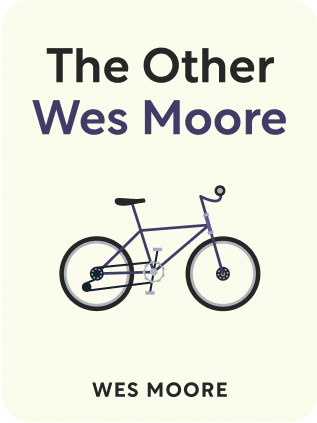

This article is an excerpt from the Shortform book guide to "The Other Wes Moore" by Wes Moore. Shortform has the world's best summaries and analyses of books you should be reading.
Like this article? Sign up for a free trial here .
Are you looking for The Other Wes Moore quotes? What are some of the most important quotes from The Other Wes Moore?
This book questions the influence of family and environment in young men’s lives and the possible steps to be taken to ensure success. These The Other Wes Moore quotes identify some of the core messages from the book and from Wes Moore’s life.
Keep reading for The Other Wes Moore Quotes.
The Other Wes Moore Quotes
Below are five The Other Wes Moore quotes. The Other Wes Moore chronicles the lives of two men with the same name. Both Wes Moores are black men who grew up in the inner-city communities of Baltimore City and the Bronx. Both were raised by single mothers within the same era. However, one ended up a decorated military veteran and academic scholar and the other a convicted murder with a life sentence.
“The chilling truth is that Wes’s story could have been mine; the tragedy is that my story could have been his.
In the first of The Other Wes Moore quotes, Moore is often asked what the difference was that allowed him to succeed and Wes to live a life behind bars. Moore is the first to admit that, after everything, he still doesn’t know.
He’s learned that both nature and nurture play important roles in people’s lives, and pinpointing which one or which moment led one of them this way or that is difficult. Sometimes genetics and environment are strong indicators of one’s future, and sometimes people just experience a string of bad luck.
“The common bond of humanity and decency that we share is stronger than any conflict, any adversity, any challenge. Fighting for your convictions is important. But finding peace is paramount. Knowing when to fight and when to seek peace is wisdom.”
A perfect example of this happened one Saturday night, Moore and Dalio, another platoon leader, had just put their platoon to bed and were rushing to make it to a pizza place before they closed. Dressed in uniform, they walked into town down a dimly lit street. They’d only been walking for ten minutes when a car pulled up next to them. The boys peered into the car, ready to assist the driver they assumed was lost. What they found instead was a group of drunk white teenagers.
They moved to the shadowy edges and started speed-walking. As the boys crossed to the entrance of the pizza shop, Moore heard someone yell a racial slur at him. He stopped, turned to confront the voice, and was struck in the face with something hard. Moore was bleeding from the mouth and had a chipped tooth. The car drove off, but he knew they weren’t gone for good.
Moore was conflicted. He was filled with rage but also embarrassed to be treated like that in front of his white friend. He also felt shame at running away, instead of staying to fight.
Moore thought about the middle name his father had chosen, Watende—“revenge will not be sought”—and wanted to live up to it.
“This book is meant to show how, for those of us who live in the most precarious places in this country, our destinies can be determined by a single stumble down the wrong path, or a tentative step down the right one.”
Moore believes there isn’t anything concrete that will determine whether a young person goes one way or another. But he does think that ensuring our youth have the resources, knowledge, and support they need to head down a good path is essential.
Moore also believes that young people need strong mentors in their lives. The tendency to focus only on what is right in front of them is strong in young people. What made the difference for him were all the people who steered him to look for more than that. They helped him see that being black and poor, not having a father, and living in underserved and crime-ridden communities didn’t dictate what kind of future he could have. They allowed him to understand what freedom meant. Both he and Wes hope that kids today will understand that this freedom exists. Moore believes it is the responsibility of all of us to make sure they do.
“I guess it’s hard sometimes to distinguish between second chances and last chances.”
The Other Wes Moore quotes Wes when he is speaking to Moore in prison. Wes agreed that accountability to others was hard. Sometimes, you do the wrong thing so you can take care of other people. Often, you only get one chance to make a mistake. Even if there is a second chance, sometimes it’s not possible to make a different choice.
Wes stated that both Wes Moores had made some big mistakes in their childhoods. Both had opportunities to try again and do better. Wes said the difference was contextual. If the circumstances surrounding the first mistake are exactly the same, sometimes a second chance is just another chance to fail.
“When it is time for you to leave this school, leave your job, or even leave this earth, you make sure you have worked hard to make sure it mattered you were ever here.”
The Other Wes Moore quotes Colonel Murphy from Valley Forge military school. Murphy announced he was leaving the school to undergo treatment for advanced-stage cancer. This hit Moore hard and he thought about the transient nature of life and about his father.
Moore’s father, Westley, had passed away suddenly when Moore was only three. The tragedy of Westley’s death is in the mishandling of his case by the previous doctors. He’d come in seeking help, but he was unkempt and from a poor neighborhood. The doctors had written him off. If they’d seen a man deserving of care, they could have saved his life

———End of Preview———
Like what you just read? Read the rest of the world's best book summary and analysis of Wes Moore's "The Other Wes Moore" at Shortform .
Here's what you'll find in our full The Other Wes Moore summary :
- How two men from similar communities can have vastly different lives
- What led one Wes Moore to become a Rhodes Scholar
- What led the other Wes Moore to a life sentence






